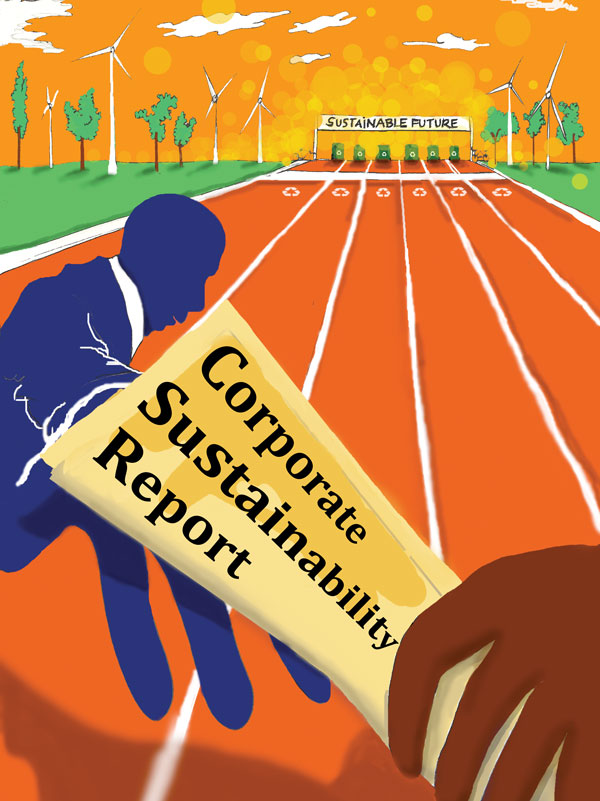By Ioannis Ioannou and George Serafeim
In the last two decades a growing number of companies across sectors and geographies are communicating to their stakeholders their initiatives and performance within the environmental, social and governance (ESG) domains.
For many decades the cornerstone of corporate reporting has been financial information that is presented in a company’s annual, semi-annual and quarterly reports. These comprehensive financial reports — required by law for public companies in most countries worldwide — have provided shareholders as well as other interested stakeholders with rather elaborate information on the company’s operations and strategic activities during the preceding fiscal year. Financial reports, which typically include the balance sheet, the income and cash flow statements, the statement of retained earnings, and other notes on the firm’s financial position, also incorporate statements from the CEO, as well as statements referring to significant corporate events and accounting principles.
However, in the last two decades and in addition to these financial reports, a growing number of companies across sectors and geographies are communicating to their stakeholders their initiatives and performance within the environmental, social and governance (ESG) domains. Indicatively, as of July 2011, there were over 33,000 such reports publicly available on “Corporate Register”, a database that archives such non-financial reports. Disclosure of non-financial reports has also generated heated debates about whether such information is useful for stakeholders, whether disclosure along ESG dimensions should be mandated by regulation, and if yes, what form such regulation should take. The underlying debate, of course, relates to the broader issue of the role of the business organization within civil society and whether it may contribute towards the world’s acute problems via some form of corporate social responsibility (CSR) through a sustainable business model that also generates superior financial performance.
[ms-protect-content id=”9932″]
Corporate Social Responsibility and sustainability reporting
The concept of corporate social responsibility first surfaced in the 1970s as both companies and governments began to look beyond financial performance, for a more comprehensive understanding of the company’s long-term value-creating potential. In subsequent years, a number of high-profile disasters, such as the 1984 Union Carbide gas leak in India and the 1990 Exxon Valdez oil spill in Alaska, brought the issue of corporate accountability and transparency to center stage.1 In the early 1990s, CSR initiatives were supplemented with a new form of corporate reporting whereby companies voluntarily started disclosing nonfinancial information, such as corporate philanthropic donations or the environmental footprint of their manufacturing operations.2 In 1995, Royal Dutch Shell, a global oil and gas company headquartered in the Netherlands, faced criticism for alleged human rights violations stemming from its operations in Nigeria. Some investors as well as the public temporarily lost confidence and trust in the company due to extensive campaigns against Shell. Thus, as part of an effort to educate consumers and rebuild its reputation, Shell issued a CSR report in 1998, becoming the first large corporation to do so up to that time.3 Given the increasing momentum of CSR during this time, in 2002 the European Union (EU) formally defined CSR as “a concept whereby companies integrate social and environmental concerns in their business operations and in their interaction with their stakeholders on a voluntary basis”.4In other words, CSR and its broader implications for civil society were effectively elevated by the EU as a major area for future inquiry, political interest and potentially, regulation.
The increasing interest in CSR initiatives adopted by various firms as well as their implications in terms of both social and financial impact was also accompanied by the publication of nonfinancial corporate reports that tried to communicate the social and environmental impact of corporations. Between 1992 and 1998, almost 90% of the corporate nonfinancial reports issued fell into one of two broadly defined categories: a. Environment or b. Environmental, Health, and Safety (EHS).5 By 2004, all the reports that were released were classified in three categories: a. Environment, b. EHS categories, and c. a new, more general category termed “corporate responsibility or sustainability” reports.6 More importantly, by 2010, 75% of the nonfinancial reports that were released by firms around the world were classified as corporate responsibility or sustainability reports.7 Companies that were issuing reports in this last category, aimed to demonstrate their commitment to the environment, social issues, their employees, and the community; to promote transparency and soliciting feedback on their performance; to respond to demands for information from a growing number of stakeholders; to disclose their efforts to build and maintain relationships with external parties; to better manage, mitigate and communicate long-term risk; to enhance or protect their reputation; and to grow shareholder and brand value.8
Concurrently, during the decade 1999 to 2009, nonfinancial reporting grew significantly, starting with 35% of the Global Fortune 250 reporting in 1999, all the way to 80% reporting by 2009.9 However, of the roughly 63,000 multinational corporations that operated globally in 2010, only 5,162 from 61 different countries10issued a sustainability report11. Industry observers have given a number of reasons for this rather low rate of sustainability reporting: a. corporations found it difficult to quantify ESG information and produce meaningful metrics b. corporations thought that sustainability issues were insignificant or immaterial to their line of business, or c. corporations did not believe that reporting could lead in any way to improved profitability.12 In some other cases, it appeared that companies were choosing to focus instead on traditional financial reporting.
Another reporting innovation that has emerged recently is what came to be known as “integrated reporting”. Unlike a sustainability report that is issued separately from the annual financial report, an integrated report is a single document that presents and explains both financial and nonfinancial information in a holistic manner, as part of the corporation’s overall business model.13This type of reporting has been developed in response to the expressed need for more sophisticated and nuanced disclosures that explicitly and directly link a corporation’s strategy, risk, key performance indicators, and financial performance.14 Commentators have argued that the use of an integrated report, or “One Report,” could be an effective “way of communicating to all stakeholders that the company is taking a holistic view of their interests.”15In other words, integrated reporting represents an evolution of sustainability reporting whereby reporting firms become more sophisticated in their understanding of sustainable business models, at the core of which lies the idea that positive social and financial impact can be highly interdependent and mutually reinforcing in the longer-term, and thus highly beneficial to stakeholders.
The consequences of sustainability reporting
Despite all the recent developments in the reporting arena, the consequences of sustainability reporting have not been, as of yet, very well understood, both at the level of the firm, as well as the level of the country. To begin with, it is worth asking the question of why stakeholders would even care about whether corporations report on their sustainability initiatives and resulting performance. In a recent research paper16 we explored this question and we found that sustainability reporting has important effects on key country characteristics: countries that mandate sustainability reporting through various laws and regulations enjoy an enhanced social responsibility of business leaders within society, with companies attributing higher priority to both sustainable development and employee training. Moreover, we document in our study that the adoption of ethical practices by firms and efficient corporate governance become significantly more widespread in the countries that adopt mandatory sustainability reporting. Consequently, as a result of all the above effects, we also find that managerial credibility within society significantly increases (Figure I). Moreover, in our study we find that these positive effects become more pronounced in countries with stronger mechanisms for enforcing laws and regulations, and in countries with more widespread assurance of sustainability reports by third-parties. Thus, both stronger enforcement and widespread assurance enhance the credibility of sustainability disclosures and as a result magnify the positive effects of reporting.
In our work we suggest the mechanisms through which sustainability reporting may fundamentally affect managerial practices and subsequently have a profound influence on the several social dimensions that we discussed above. More specifically, we argue that sustainability reporting can effectively increase transparency around the social and environmental impact of companies, and provide a more detailed review of their governance structure. Second, it can have a direct impact on internal management practices and processes by generating the right incentives for executives to manage their relationships with key stakeholders more effectively through instituting a mind-frame focused on a longer-term horizon, to participate in contracts based on mutual trust and cooperation and, thus enabling them to consider sustainable business models that generate both a positive social and financial impact.
Furthermore, the process of putting together a sustainability report itself may allow executives to uncover hidden business opportunities or disguised risks that were not previously obvious to the firm and that might not have become apparent otherwise. Examples of hidden opportunities include the possibility of increased operational efficiency through better water and/or energy management while uncovering disguised risks may involve the explicit management of reputational risks within the supply chain due to the possibility of human rights’ violations, or the detection of unwanted bribery and corruption activities. In other words, extensive disclosure of ESG issues by firms can lead to increased transparency as well as “self-reflection”, thus allowing and enabling investors, key stakeholders, as well as the managers themselves, to better understand how sustainability policies are linked to the creation of long-term economic value; consequently, sustainability reporting may result in a subsequent significant and positive change in managerial practices towards ESG matters with the potential to lead to enhanced profitability and better performance along the ESG metrics.
Moreover, sustainability reporting may more accurately and pragmatically characterize the foundations of the firm’s financial performance, thus revealing potential weaknesses in the business model. For example, firms that generate profits by imposing significant negative externalities on society are at a higher risk of regulatory action, and eventually may lose their license to operate. Customers may dessert or even boycott firms that engage in socially and environmentally irresponsible behavior. Attracting and retaining high quality employees is also more difficult and costly for companies that act irresponsibly. The increasing ESG-data integration in valuation models by sell-side analysts,17 as well as the ESG integration and engagement by activist investors, suggest that irresponsible firms are likely be penalized by key capital market participants.18Therefore, as a result of regulatory, customer, employee and investor pressure, the profitability of firms with low ESG performance is less likely to persist.
For all the above reasons therefore, sustainability reporting can fundamentally shift existing managerial practices because through broader disclosure, managers are held accountable for multiple dimensions of performance, beyond simply the corporation’s financial performance. Thus, countries that mandate sustainability reporting through laws and regulations may generate positive systemic effects at the level of society. Stated differently, forcing the majority of companies in a country to disclose their ESG policies has the potential to systematically influence managerial practices across all companies within the country and raise the overall level of social responsibility and managerial credibility within society. By mandating sustainability reporting, regulators also send a strong signal to the business community and the society more broadly, about the long-term goal of the country as whole towards more sustainable organizations, and more sustainable ways of wealth generation. Indicatively we should mention the South African regulators, who by adopting the King Code of Governance Principles for South Africa (2009) highlighted the need for a fundamental shift in the way managers and directors act, and the important positive implications of such a shift on society at large.
Concluding remarks
Given the continuously growing attention being paid to issues of CSR and Sustainability worldwide, as well as the recent debates around sustainability and integrated reporting practices, our research has important implications for both executives and regulators. The findings of our work suggest that mandatory sustainability reporting not only promotes corporate transparency, but can also fundamentally shift corporate behavior towards more socially responsible practices due to elevated public accountability on performance measures that extent beyond financial performance alone. At the same time, our work highlights the critical role of strong enforcement mechanisms as well as the need for credible, reliable and assured sustainability information. Moreover, we propose that executives could use sustainability reporting as an efficient and effective communication tool for building more sustainable communication channels between the firm and its key stakeholders, making the firm more trustworthy and reliable. Building a strong reputation for socially responsible corporate behavior may also rapidly translate into a competitive advantage in labor, product and capital markets and consequently, may result in superior long-term economic value. In other words, the message of our work is clear: ensuring that companies take a good look at and report on how they are doing in nonfinancial areas makes a real difference in how they behave and by extension, a real positive difference in how they contribute towards a formidable goal: building a sustainable society for all.
About the authors
Ioannis Ioannou is an Assistant Professor of Strategic and International Management at the London Business School. His research focuses on two major issues: the links between sustainability and capital markets, and the determinants of corporate social performance around the globe. His broader area of expertise is the strategic role of corporate social responsibility in the business models of organizations. Ioannis holds a B.A. degree in Economics and Mathematics from Yale University, and a PhD degree in Business Economics from Harvard University.
George Serafeimis an Assistant Professor of Business Administration at the Harvard Business School. Professor Serafeim’s research interests are international, focusing on capital markets and on the social, environmental, and governance performance of firms. His work has been published in prestigious academic journals such as the Review of Accounting Studies, Journal of Accounting Research, Best Paper Proceedings of the Academy of Management and Financial Analysts Journal. Professor Serafeim earned his doctorate in business administration at Harvard Business School, and his master’s degree in accounting and finance from the London School of Economics and Political Science.
Notes
1. Matthew Maguire, “The future of Corporate Social Responsibility Reporting,” The Fredercik S. Pardee Center for the Study of the Longer-Range Future, Boston University, January 30, 2011, available at http://www.bu.edu/pardee/files/2011/01/PardeeIIB-019-Jan-2011.pdf, accessed April 2011.
2. European Commission, “Communication from the Commission to the European Parliament, the Council and the European Economic and Social Committee: Implementing the Partnership for Growth and Job: Making Europe a Pole of Excellence on Corporate Social Responsibility,” March 22, 2006, available at http://eur-lex.europa.eu/LexUriServ/LexUriServ.do?uri=COM:2006:0136:FIN:en:PDF, accessed April 2011.
3.Corporate Watch, “What’s Wrong with Corporate Social Responsibility? Corporate Watch Report 2006,” 2006, available at http://www.corporatewatch.org/?lid=412, accessed April 2011
4. European Commission, “Communication from the Commission Concerning Corporate Social Responsibility: A business contribution to Sustainable Development,” COM(2002)347-final, July 2, 2002, available at http://europa.eu/legislation_summaries/employment_and_social_policy/employment_rights_and_work_organisation/n26034_en.htm, accessed April 2011.
5. Corporate Register, “CR Reporting Awards: 2011 Global Winners & Reporting Trends,” March 24, 2011, available at http://www.corporateregister.com/downloads/, accessed April 2011. 6. Ibid
7.Corporate Register, “CR Reporting Awards: 2011 Global Winners & Reporting Trends,” March 24, 2011, available at http://www.corporateregister.com/downloads/, accessed April 2011.
8. Katelijne van Wensen, Wijnand Broer, Johanna Klein, and Jutta Knopf, “The State of Play in Sustainability Reporting in the European Union,” prepared for the European Commission by CREM B.V. and Adelphi Consult, January 2011, via Corporate Sustainability Reporting, available at http://www.reportingcsr.org/european-p-210.html, accessed May 2011; and, American Institute of CPAs, AICPA, “Sustainability Accounting and Reporting,” May 3, 2010, available at http://www.aicpa.org/InterestAreas/BusinessIndustryAndGovernment/Resources/Sustainability/Pages/SustainabilityFAQs.aspx, accessed April 2011.
9. European Commission, Directorate-General for Enterprise and Industry, 2010.
10. Corporate Register, “CR Reporting Awards: 2011 Global Winners & Reporting Trends,” 2011
11.Ibid
12. David W. Case, “Corporate Environmental Reporting as Informational Regulation: A Law and Economics Perspective,” 2005, University of Colorado Law Review, 76 U. Colo. L. Rev. 379, via LexisNexis Academic, accessed April 2011; and, Matthew Maquire, 2011.
13. Robert G. Eccles and Michael Krzus, 2010, One Report: Integrated Reporting for a Sustainable Strategy, 2010, NewYork: John Wiley and Sons, Inc.
14. The Prince of Wales Accounting for Sustainability Project, “Reporting,” available at http://www.accountingforsustainability.org/reporting/, accessed May 2011.
15. Robert G. Eccles and Michael Krzus, 2010, One Report: Integrated Reporting for a Sustainable Strategy, 2010, NewYork: John Wiley and Sons, Inc.
16. A copy of the paper is available here: http://papers.ssrn.com/sol3/papers.cfm?abstract_id=1799589
17. We refer the interested reader to our HBS working paper titled “The Impact of Corporate Social Responsibility on Investment Recommendations”.
18. For example, Goldman Sachs is one of the firms to have carried out analysis of the relationship between how companies address these ESG issues and the returns they generate (Goldman Sachs, 2009): it contends that in a number of sectors there is a positive correlation between sustainable business practices and the longer-term financial success of that company.
[/ms-protect-content]





































